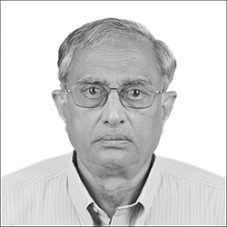Delimitation of Indian states — rewarding the Hindi belt
By EAS Sarma
This is a copy of a letter from EAS Sarma to the chief ministers of Tamil Nadu and Andhra Pradesh, about the dangers of delimitation without freezing the population to the population numbers as in the 1971 census . This letter has major implication for the Indian polity and even the Constitution.
E.A.S.Sarma
14-40-4/1 Gokhale Road
Maharanipeta
Visakhapatnam 530002
Mobile: 91-9866021646
Email: eassarma@gmail.com
To
Shri M K Stalin
Chief Minister
Tamil Nadu
Shri Y S Jagan Mohan Reddy
Chief Minister
Andhra Pradesh
Dear Shri Stalin and Shri Jagan Mohan Reddy,
Kindly refer to the Indian Express news report dated 24-8-2021, “TN should get Rs
5,600 cr compensation for loss of two MP seats: Madras HC”
(https://indianexpress.com/article/india/tn-should-get-rs-5600-cr-compensation-for-
loss-of-two-mp-seats-madras-hc-7467586/).
The issue that arises in this connection is that the Southern States which have
been able to achieve impressive results in family planning over the decades will
stand to lose in terms of their representation in the Lok Sabha, whereas those
States, primarily in the Gangetic belt, where the average rates of population
growth have exceeded the All india average will stand to gain, if the population
basis for delimitation is to be shifted from 1971 to 2021 or 2031 as per the decade.
The legal position is as follows.
“The Constitutiont) Act, 2001 and the Constitution (Eighty-
seventh Amendment) Act, 2003 have, inter alia, amended Articles 81, 82, 170, 330
and 332 of the Constitution of India. The cumulative effect of these amendments to
the Constitution is that –
- the total number of existing seats as allocated to various States in the House of
the People on the basis of 1971 census shall remain unaltered till the first census to
be taken after the year 2026; - the total number of existing seats in the Legislative Assemblies of all States as
fixed on the basis of1971 census shall also remain unaltered till the first census to
be taken after the year 2026;”
Even though the boundaries of constituencies were altered in 2001 to equate
population among the Parliamentary and assembly seats; the number of Lok
Sabha seats that each state has and those of legislative assemblies has remained
unaltered since 1971 census and may only be changed after 2026 as the
Constitution was again amended (84th amendment to Indian Constitution) in 2002
to continue the freeze on the total number of seats in each state till 2026. This was mainly done as States which had implemented family planning widely
like Kerala, Tamil Nadu and Pun jab would stand to lose many parliamentary
seats representation and States with poor family planning programs and
higher fertility rates like Uttar Pradesh, Bihar and Rajasthan would adversely
gain many of the seats transferred from better-performing States.
To illustrate the impact of the higher population growth rates on delimitation, I have
tabulated the position below w.r.t the Lok Sabha seat shares vis-a-vis the
incremental/ decremental population growth rates as per the Census figures for
2001-2011.
States whose performance in family planning was better.
| State | % of LS Seats pre- delimitation |
% of LS Seats post-delimitation |
Decadal population growth % (+/-) (2001- 2011)w.r.t All India average |
| AP | 4.6 | 4.3 | -6.7 |
| Telangana | 3.1 | 3 | -6.7 |
| Tamil Nadu | 7.2 | 7.1 | -2.1 |
| Karnataka | 5.2 | 5.2 | -2.1 |
| Kerala | 3.7 | 3.5 | -12.8 |
| Odisha | 3.9 | 3.8 | -3.7 |
| W.Bengal | 7.7 | 7.4 | -3.9 |
| Total % of seats in LS |
35.4 | 34.3 |
States whose population growth rates are higher than the national average.
| State | % of LS Seats pre-
delimitation |
% of LS Seats post-delimitation |
Decadal population growth % 2001-2011 (+/) w.r.t All India |
| UP | 14.7 | 15.3 | 2.5 |
| Bihar | 7.4 | 7.9 | 7.7 |
| MP | 5.3 | 5.6 | 2.6 |
| Haryana | 1.8 | 2 | 2.2 |
| Gujarat | 4.8 | 5 | 1.6 |
| Rajasthan | 4.6 | 5.1 | 3.6 |
| Total % of seats in | 38.6 | 40.9 |
LS
The above figures will change further if the population growth rates for 2011-2021
are to be considered.
In other words, the six States with higher population growth rates will have a
representation of 40.9% in the Lok Sabha, based on the increased share in the
population, if the population basis is to be shifted from 1971 to 2031. This implies
that those States that performed well in family planning will have to pay the penalty
of having a lower share in the number of Lok Sabha seats, where as those
primarily in the Gangetic region, whose population growth rates continue to be
much higher than the national average will gain and have a more dominating role
in the Lok Sabha.
The same logic will apply to the legislative Assemblies and, indirectly, the Rajya
Sabha numbers.
A similar issue arose when the Centre had unilaterally shifted the population base
from 1971 to 2011 in the Terms of Reference for the last Finance Commission,
when I had raised the matter with the President of india. A copy of my letter is
enclosed.
Representation for the States in the Parliament has crucial importance in the
matter of the Centre-State relations and in ensuring that some States do not be at
a disadvantage politically for implementing family planning better than the other
States.
In the case of the European Union where a similar problem had been
encountered, the European nations adopted the “principle of degressive
proportionality” which implies that some weightage is given to declining population
growth rates etc. resulting from policy measures of the respective governments.
The Delimitation Commissions should adopt a similar approach in India.
Since the question of lifting the freeze on the 1971 population basis is imminent, I
suggest that the affected States come together to discuss this issue urgently and
bring political pressure on the Centre and the other States not to disturb the status
quo.
Kindly treat this as most urgent.
Regards,
Yours sincerely,
E A S Sarma
Former Secretary to Govt of India
Visakhapatnam
24-8-2021
2 attachments
TN should get Rs 5,600 cr compensation for loss of two MP seats: Madras HC | India News,The
^2 Indian Express.pdf
1688K
Gmail – Abrupt changes in the Terms of Reference for the Fifteenth Finance Commission (FFC)
““21 without taking the States into confidence- Not desirable.pdf
998K










































COMMENTS